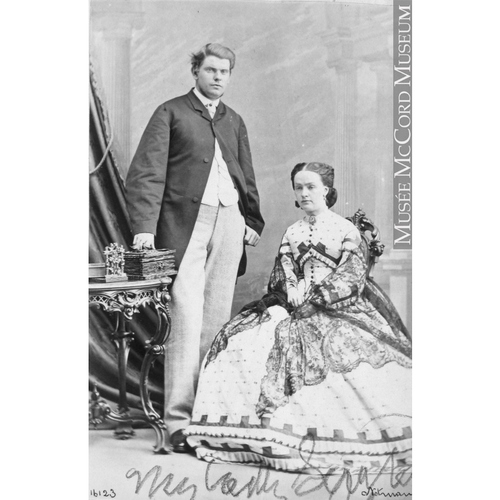MILLER, JAMES ANDREWS, lawyer, judge, and politician; b. 29 July 1839 in Galt (now part of Cambridge), Upper Canada, second son of John Miller, a lawyer; m. 8 June 1865 Henrietta Ranney of St Catharines, Canada West; d. 1 Nov. 1886 in Winnipeg, Man.
James Andrews Miller was educated in Galt, Simcoe, and Toronto, and in 1859 he received a ba with honours in classics and mathematics from Trinity College, Toronto. He articled with Richard Miller in St Catharines, where he practised law after being called to the bar of Upper Canada in 1863. Two years later Miller earned a bcl from Trinity College (which conferred a dcl on him in 1873). He served as president of the Lincoln County Conservative constituency association for many years, and in a federal by-election in Lincoln in 1877 was the unsuccessful Conservative candidate.
On 11 Oct. 1880 Miller was created a qc, and nine days later was appointed a puisne judge of the Court of Queen’s Bench of Manitoba. He accepted this appointment with Sir John A. Macdonald*’s assurance that he intended to appoint Miller chief justice when the incumbent, Edmund Burke Wood, who was in ill health, no longer held the position. In May 1882 Miller protested the low salaries paid to Manitoba judges and threatened to resign unless they were increased. He did not carry out this threat immediately, however. When the federal government appointed Lewis Wallbridge chief justice later that year, Miller resigned from the bench, effective 31 Dec. 1882. The Law Society of Manitoba supported Miller, at least in the matter of salaries, and showed its high regard by presenting him with a silver tea-service.
Miller now resumed the practice of law. He was admitted to the Manitoba bar on 8 Feb. 1883, but refused to pay the usual admission fee on the ground that a former judge had a right to admission as a “visitor” of the law society. His name was struck from the rolls on 10 Oct. 1884, but he was reinstated in June 1885 after a court ruled in his favour.
At the request of Premier John Norquay, Miller had turned once again to politics, and on 23 Jan. 1883 he ran unsuccessfully as the Conservative candidate in the provincial constituency of Rockwood. However, after being appointed to replace Alexander Macbeth Sutherland as attorney general on 6 September, Miller was elected by a large majority in the constituency of Varennes on 28 Sept. 1883. Varennes was in an area over which both Manitoba and Ontario claimed Jurisdiction, and in fact on the day Miller was elected the inhabitants had also voted in an Ontario provincial election as part of the Algoma riding. As Manitoba’s attorney general, Miller met with the Ontario premier, Oliver Mowat*, and they agreed to submit the dispute to the Judicial Committee of the Privy Council, which ruled in Ontario’s favour in July 1884. Miller thus lost his assembly seat and resigned from the government on 11 Dec. 1884.
When a new system of land registration was introduced in 1885, Miller was named the first registrar general. On 27 Oct. 1886 Miller slipped on the stairs of the McKenzie Hotel in Winnipeg, where he lived, and fell to a marble floor below. He was a very heavy man, and he sustained injuries which resulted in his death five days later.
Arch. of Western Canadian Legal Hist., Faculty of Law, Univ. of Manitoba (Winnipeg), Docs. relating to the striking of the Honourable J. A. Miller’s name from the roll of the law society. Law Soc. of Manitoba (Winnipeg), Minute books, 21 July 1881; 27, 29 May 1882. PAC, MG 26, A. Daily Manitoban (Winnipeg), 1 Nov. 1886. Daily Sun (Winnipeg), 24 Dec. 1883. Manitoba Daily Free Press, 25, 29, 30 Oct., 6 Nov. 1880; 17 Oct., 3, 6 Nov., 19 Dec. 1882; 1, 3, 9, 16, 24 Jan., 5–7, 13, 28, 29 Sept. 1883; 6 March, 3, 11 Dec. 1884; 29, 30 Oct., 2–4 Nov. 1886. St. Catharines Journal (St Catharines, [Ont.]), 8 June 1865. R. D. and Lee Gibson, Substantial justice: law and lawyers in Manitoba, 1670–1970 (Winnipeg, 1972), 136–38, 143–45, 156, 159–60.
Cite This Article
Lee Gibson, “MILLER, JAMES ANDREWS,” in Dictionary of Canadian Biography, vol. 11, University of Toronto/Université Laval, 2003–, accessed February 21, 2026, https://www.biographi.ca/en/bio/miller_james_andrews_11E.html.
The citation above shows the format for footnotes and endnotes according to the Chicago manual of style (16th edition). Information to be used in other citation formats:
| Permalink: | https://www.biographi.ca/en/bio/miller_james_andrews_11E.html |
| Author of Article: | Lee Gibson |
| Title of Article: | MILLER, JAMES ANDREWS |
| Publication Name: | Dictionary of Canadian Biography, vol. 11 |
| Publisher: | University of Toronto/Université Laval |
| Year of publication: | 1982 |
| Year of revision: | 1982 |
| Access Date: | February 21, 2026 |



